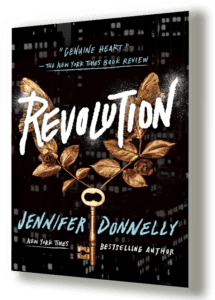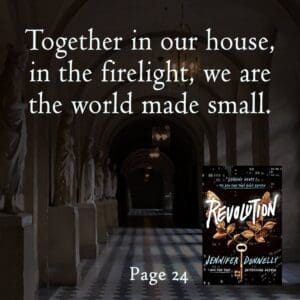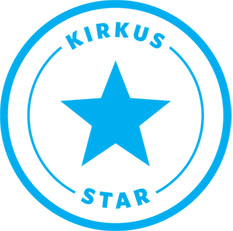You have no items in your cart. Want to get some nice things?
Revolution
Two girls, two centuries apart. One never knowing the other. But when Andi finds Alexandrine’s diary, she recognizes something in her words and is moved to the point of obsession. There’s comfort and distraction for Andi in the journal’s antique pages—until, on a midnight journey through the catacombs of Paris, Alexandrine’s words transcend paper and time, and the past becomes suddenly, terrifyingly present.

The Story
As you might expect from the title, this book is about a revolution. On one level, it’s about the French Revolution and one of its smallest victims. On another level, it’s about the revolution inside, about the changes we as human beings go through as we struggle to make sense of our world and its tragedies.
The story centers on two girls – one who lives in present day Brooklyn and has suffered the loss of her younger brother. And one who lived in 18th Century Paris and witnessed one of the worst crimes of the French Revolution. Andi, the Brooklyn girl, travels to Paris, becomes obsessed with a diary that belongs to Alex, the French girl, and their stories converge.
Inspiration
Revolution got started ten years before I published the book. I was reading the New York Times and saw an article – “Geneticists’ Latest Probe: The Heart of the Dauphin.” It showed a picture. Of a glass urn with a heart in it. I couldn’t take my eyes off it. The article said that a human heart, very small and very old, that had been in a glass urn in the Basilica of St. Denis in Paris, had just undergone DNA testing and had been found to be the heart of Louis Charles, the son of Louis XVI and Marie Antoinette.
I knew, as you probably do, that during the French Revolution Louis and Marie Antoinette were imprisoned and eventually guillotined by the revolutionaries – who were at that point led by Robespierre. What I didn’t know, though, was that after the king and queen were executed, their children – fourteen-year-old Marie-Therese and eight-year-old Louis Charles, the dauphin — were kept in prison. Marie-Therese would survive her imprisonment and would be released in 1795. Louis-Charles was not so lucky.
As heir to the throne, he was seen as a threat by the revolutionaries. It was rumored that powerful people were plotting to free the child and rule in his name. To prevent this, Robespierre and his crew essentially had Louis Charles walled up alive. He was kept in a small dark cold cell. Alone. Without books and toys. Without enough food or a fire. He became sick. And he went mad. And eventually he died. At the age of ten.

Needless to say, that article really upset me. I couldn’t stop thinking about it. Couldn’t stop wondering how the idealism of the revolution devolved into such cruelty. I went to bed thinking about it. Woke up thinking about it. I recognized the feeling – it’s how I feel when a book is starting inside me. But I couldn’t act on that feeling because I had other books due at the time. Nonetheless, the story stayed with me. Time moved on. I finished the other books. And I had a child. Which changed my life in many wonderful ways.
And in one not so wonderful way – after I had my daughter, I somehow lost my protective shell. The one we all have. The one that enables us to hear a horrible story on the news and still go on with our lives. When my daughter came along, suddenly every news story about an abused child destroyed me. The dreadful pictures of maimed soldiers and civilians coming out of Iraq made me weep. Reports of atrocities in Darfur undid me.
As a new mother, I knew what a child was in a way that I had not before. I knew how fragile and innocent children are. And that someone could hurt them, that they could starve in a famine, or be injured by a bomb….well, I could not understand that and I couldn’t bear it and I wondered, as I never had before, what kind of world is this that allows it? How do we manage to live in it? How do we raise children in it?
I’m sure a lot of people would say it was hormones, some kind of postpartum thing. I don’t know. All I knew was that these questions were haunting me and I had to find answers. So I set about trying to do that the only way I know how, by writing a story.
I remembered that article I’d cut out of the Times – the one on Louis Charles – and I fished it out of its folder. His story took on a new and symbolic meaning for me. What happened to Louis Charles was unspeakable, and yet, I felt that if I could face it and grapple with it, it might help me find my answer.
So I started in. And let me tell you, it wasn’t easy. In fact, Revolution is by far the hardest book I’ve written. I really struggled with it. With the form. Plot. Characters. With the research. Getting my hands around the causes and factions and power plays of the Revolution was a huge challenge.
Ten years after I first read that article in the Times, after I first saw that picture of the tiny heart in the glass urn, the book was completed. Just a few weeks ago, in fact.
It took me on a journey, this book, and how. It took a bite out of me. Cost me a lot of sleep. Etched lines on my face and on my own heart. But it gave me the answer I needed. And I hope that maybe it will do that for my readers… and for you.
Read an excerpt from the book.
Listen to an audio excerpt of the award-winning audiobook ready by Emily Janice Card and Emma Bering.
And this lovely review from MadNBooks is a performance in itself – how I love when my work touches a reader this way:



I love “Revolution”, have read it over five times when I was thirteen in 6-7th grade. I can quote most lines, love the story and the characters. I really connected with Andi and loved the historical facts you included in the book.
Even now, I still think of it and remember the story. I love the book and wish there were more out there like it. I love to read, but It’ll take a lot to keep me hooked on one book. I checked “Revolution” out of my school library at least 13 times in two years. Again, this is an amazing book. Loved it!
Thank you, Lyn. Revolution is a very special book for me, too — it was the hardest book for me to write, and it took a piece of my heart with it. I means a lot to know it touched you, too.
I read Revolution agt a very young age when I was also experiencing loss. While trying to navigate my own complex and often unidentifiable feelings this story gave me some sort of hope. It allowed me to see that even the most horrific things can be dealt with in due time, that we don’t have to hollow ourselves out in order to move on. You are an incredible author and I absolutely adore your work. You have a truly incredible gift. Thank you for sharing it with the world.
Thank you, Gabriela! This makes my day!
I was reading this book and I felt a strong connection between the characters I felt like I was there. You know? I love your books this one, in particular, had me on the edge of the seat
Thank you, and I do know — my connection to Andi and Alex was (and still is) pretty intense, too!
Have a group of 7 students starting your book- Looking forward to their book club talks and their discoveries. They already read Octavia Butler’s Kindred- and Sharon Draper’s Copper Sun- So you text is next- I am excited- Thank you for writing this text.
8th Grade ELA
Thanks for letting me know — I hope it leads to some discussion and reflection, and maybe even an internal revolution or two!
I am 13 years old and your books are really amazing and inspiring and I wish you could make more, it is unpredictable and mysterious and breathtaking
Thank you, Katrina!!
I just ready Revolution because one of my friends recommended it to me. I’m so glad they did. I absolutely loved this story. I admire how you absorb the reader into this world. When I was reading the chapter where Alex has little Louis Charles on her back and they are pounding on the glass trying to get the King to open the door I felt as though I was there with her. You write beautifully. I’m excited to explore some more of your works.
I have been reading this book since I was in sixth grade, that was seven years ago. This book… is the best literary experience ever. This book to me to all new places, taught me about the French Revolution, I could feel everything Andi or Alex was feeling. If they were sad, I felt it deeply. If they were scared, like when Alex was running from the guards one night after setting off fireworks, my heart was beating just as fast as if I was her at that moment. I have never, ever, experienced a book so deeply as I have with Revolution. Beautifully written, and so inspiring. I believed that half of these characters were real. I went searching for Amadé Malherbeau and his music, wanting to hear the music that Andi felt so deeply. I never learned of the French Revolution. I knew of it, but not about it. This book drove me to find all the information I could to teach myself. I watched Documentaries, and videos, interviews, read countless articles. It reignited my love for History. I cannot thank you enough for taking your time with this book (10 years I believe) and created literal perfection on paper. You are amazing, Never stop writing.
Wow, Sydney, what a lovely thing for you to share – thank you! It’s especially meaningful to hear that it affected you as it did – writing Revolution was a deep and difficult journey for me (I have said many times that it took a piece of my heart), and I’m so touched to hear that it’s appreciated. Xo,J
Hello,
I have been researching a lot of the books you have written as I really enjoyed reading Revolution. Originally I just grabbed it off of the shelf to do finish my school project, and I am truly so happy I did that. It is so beautifully written.
There was one quote in the book I really liked, “It goes on, this world, stupid and brutal. But I do not. I do not.”
My interpretation of the quote is that even though the world is cruel to one, it does not mean that you should be cruel as well. You can be different from the world which is brutal and stupid.
However, I would like to know the meaning you wanted to give off when you wrote that.
Hi Maria! I like your interpretation. Here’s what I said in an interview when Revolution came out about what I wanted readers to take away from the book: “I hope that readers see that though the world – as the Duc d’Orleans says – goes on as stupid and brutal tomorrow as it was today, we, as individuals, do not have to. We can reject the violence and the brutality and despair. We can move past whatever has happened to us, what has been done to us, and move toward something better.”
But I didn’t write that phrase to say that; I wrote it because that’s where the story led me. There’s a line from Dante’s Inferno I borrowed to introduce the last section of the book, and it says: “We came forth to rebehold the stars.” The phrase you ask about is me — along with my companions Alex and Andi — emerging from our dark and difficult journey and rebeholding the stars.
Hi, Jennifer!
I had to read your book Revolution for both my book club and English class, and it was perfect! Andi is a relatable character for me. What was your inspiration behind her character?
Hi Kayla! You can read all about the inspiration to Revolution on the book page here. As for Andi in particular … hmm. While I was writing the book, I hung out in cafes in Brooklyn Heights and watched and listened to teenagers from two elite private schools there: St. Ann’s and Packer. They were very self-possessed, very smart and sophisticated, but underneath it all, they were still kids –– kids struggling with huge expectations that had been placed upon them. So part of her certainly came from that. But like all my characters, I don’t feel like I created her — rather, she came to me and told me her story.
She — and Alex — are very special to me, and Rev was a very special book. Writing it took a piece of my heart and changed me forever.
I did a long interview for TeenReads when the book came out that you might be interested in. It is here.